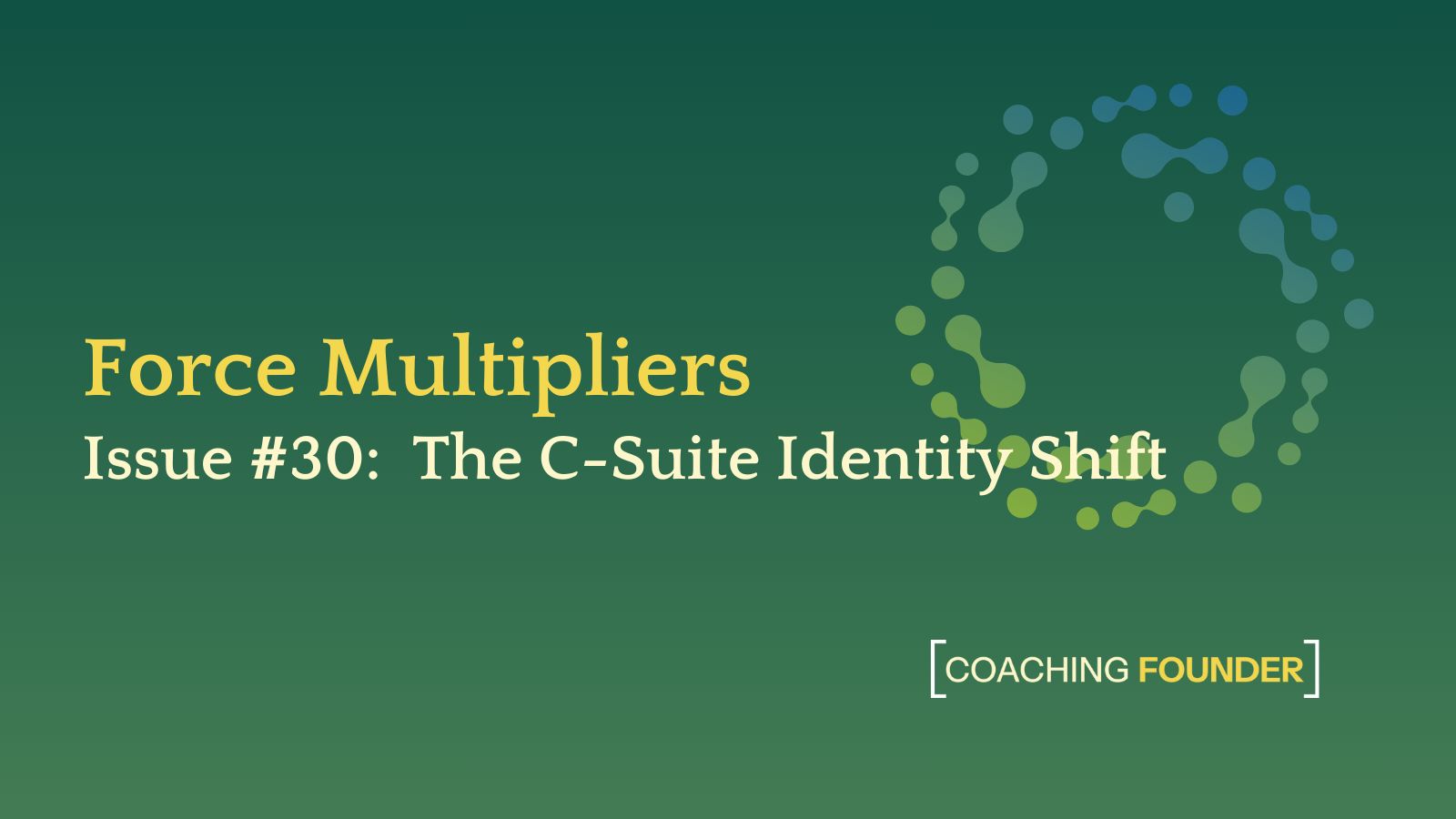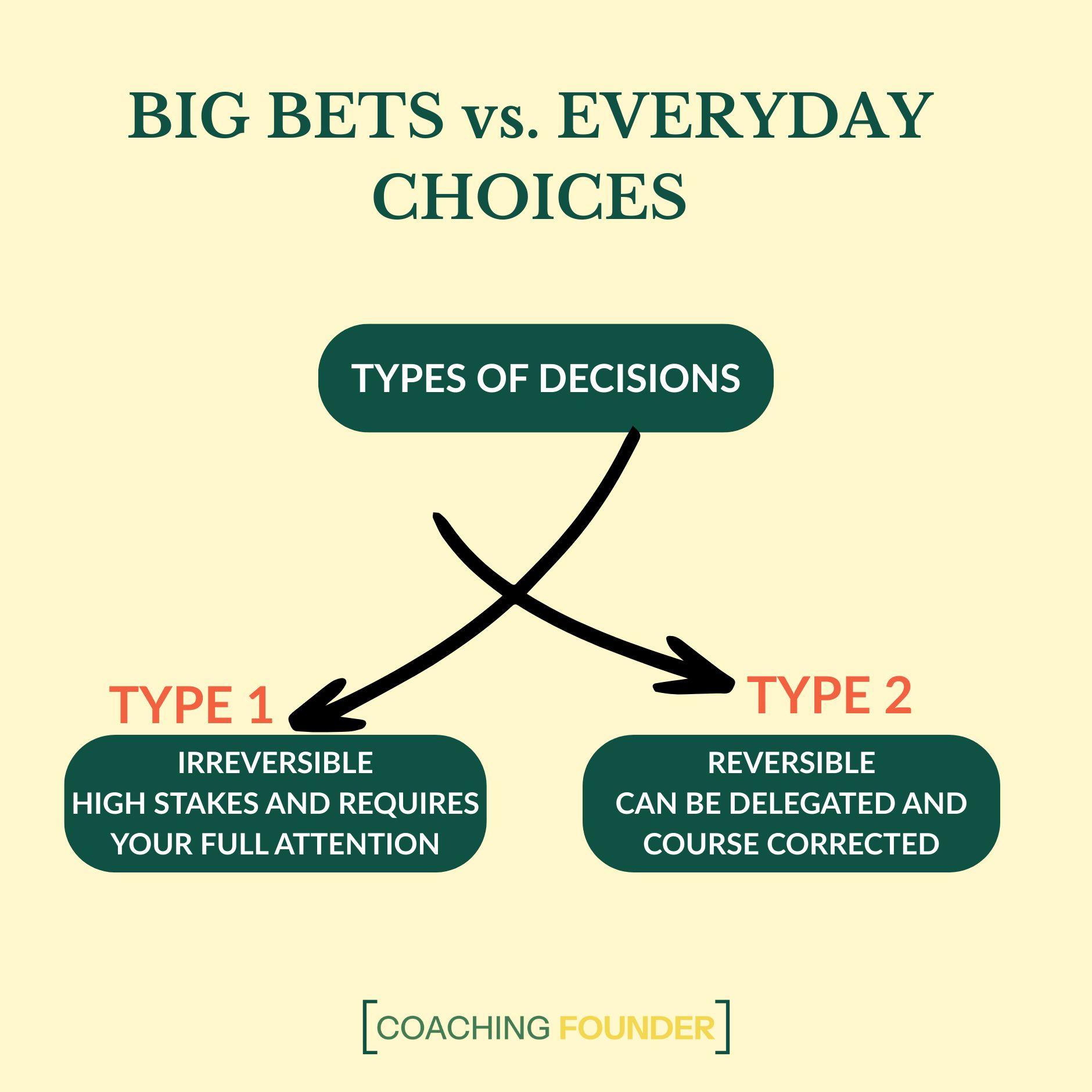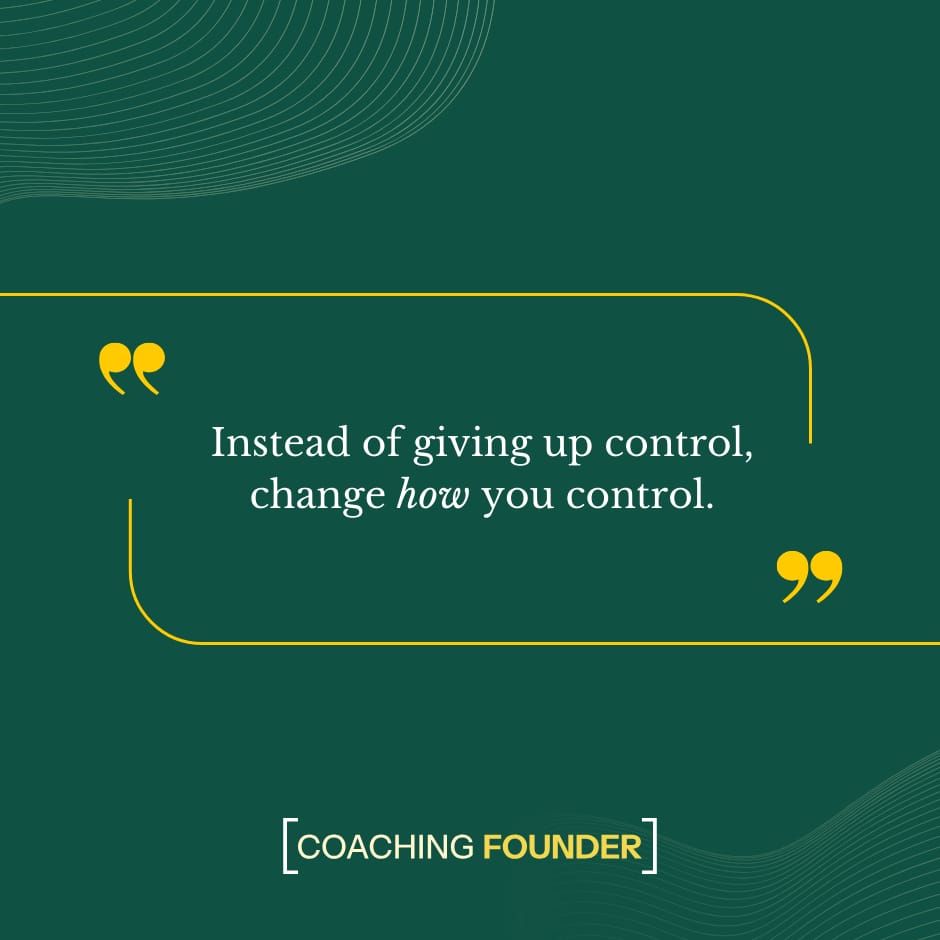- Force Multipliers
- Posts
- The C-Suite Identity Shift
The C-Suite Identity Shift
What got you here won't keep you here: how to navigate the internal upgrade that scaling leadership demands.

Hi! Welcome to another issue of Force Multipliers, your weekly briefing from Regina Gerbeaux, where Silicon Valley's behind-the-scenes operators get battle-tested frameworks for their toughest challenges, from putting out chaotic fires to managing strong personalities.
Every single week, someone successful walks into my coaching practice feeling like they're drowning.
You’d never be able to tell based on the TechCrunch headlines, the LinkedIn posts, the interviews they do. They've built something real, raised significant money, and assembled a team that believes in their vision.
But they're terrified they've somehow tricked everyone into thinking they know what they're doing. They’re barely treading water with how much they’re doing, and on top of it all, they feel like they’re faking it.
The operators that have made it this far don't have doubt about two things:
They care about their company and customers.
They are willing to work extremely hard.
But beyond that, things are more uncertain. They tell me in our calls, “I care and I work extremely hard, but what the hell do I do now that we’re actually growing and a real company?”
It doesn't matter if they're…
A young operator in their 20s thinking, "How could I ever tell anyone what to do?"
A more seasoned operator with previous companies that had mediocre success, feeling unequipped to lead this new team
An operator with successful exits, feeling the pressure to outdo their previous company
They all end up in the same place: they wonder how they can start upleveling themselves to grow with their companies and employees.
If this is you, you are not alone in feeling this way. In fact, recognizing this about yourself takes a level of self-awareness that should be celebrated. All the best CEOs have to develop this kind of honest introspection to be good at their jobs.
What you're experiencing is the C-Suite Identity Shift - the moment when your role fundamentally changes from doing the work to directing the work. And here's the unspoken part (that you need to hear!): this transition is supposed to feel uncomfortable.
The skills that got you here - scrappiness, hands-on execution, being in the weeds of everything - those were perfect for a 5-person startup. But they'll actually hurt you as you scale to 50, 100, or 500 people.
Let me walk you through the playbook that's helped dozens of CEOs make this transition successfully.
This edition of Force Multipliers is sponsored by Angel Squad!

I’m part of the 2,000+ investors learning to find outliers in early-stage startups. Get access to Hustle Fund's curated deal pipeline, weekly educational sessions, and a global community of angel investors. I’ve loved being a part of Angel Squad so much, I paid for a lifetime membership.
Force Multipliers readers get to try out Angel Squad free for 30 DAYS - use this link to access it now. Big thanks to Angel Squad for sponsoring this newsletter!
The Playbook on Shifting into a Growth-Stage C-Suite Leader
Step 1: Acknowledge the fear (and why it's giving you bad advice) 💡
First, let's call this what it is: you're scared. That's completely normal and nothing to be ashamed of.
But here's what you need to understand about fear - it gives terrible advice.
When you're operating from fear, you're setting yourself up to do things poorly because fear jumps to conclusions and doesn't involve sound thinking. Fear tells you that if you're not personally doing everything, it won't get done right. Fear whispers that delegation is just another word for losing control.
Paranoia falls into this same category. I've seen brilliant CEOs make terrible decisions because they were afraid their team couldn't handle what they'd been handling.
The reality is, you've been in control for so long that letting go feels dangerous. But staying in total control is what's actually dangerous for your company right now.
Step 2: Conduct an energy audit 📊
This is where the real work begins. You need to understand where your energy is actually going versus where it should be going.
Here's exactly how to do this:
Look at your calendar for the past 2 weeks - Pick a typical period, not when you were on vacation or dealing with a crisis.
Log everything you did - Meetings, 1-1s, deep work, eating, personal downtime, working out, quality time with friends, sleep. Everything.
Categorize everything as energy-giving or draining - There's no middle ground here. If it's not actively giving you energy, it's draining it.
For the draining activities, decide if you want to:
Eliminate it (not necessary anymore)
Delegate it (someone else takes over - push yourself to do this as much as possible)
Make it exquisite (for things you truly can't outsource, how can you make them enjoyable?)
Implement action items and revisit monthly
👉 What you'll probably discover in your energy audit
The draining stuff that shocks most CEOs:
People management and weekly 1-1s (they love mentorship but hate the grind of constant check-ins)
Managing leadership team meetings
Administrative tasks they've been doing since the early days
Being the default person for every "quick question"
☝️ Regina’s take: You shouldn't have to manage most of these. Get a Chief of Staff to handle leadership meetings, or make them exquisite by requiring pre-writing and pre-reading from everyone.
(Check out my write-up "Run Efficient Meetings That Don't Suck" below for the full playbook on this!)
The energy-giving stuff that’s often neglected:
Reading and deep work
Going deep into the product
Mentoring teammates with hands-on research or strategic thinking
Talking to customers
Getting coaching to level up personally
Outside of work: working out, resting, quality time with loved ones
Team retreats and quality time with the whole company
Step 3: Focus on your Zone of Genius and Type 1/2 decisions 🎯
Once you've done your energy audit, it's time to get clear on what only you can do as CEO.
80% of your time should be spent in your Zone of Genius, which can include:
Being the visionary for the company
Guiding everyone in the right direction
Investor relations
Product decisions (if you're technical or a core user)
Everything else should be delegated, especially Type 2 decisions.
Jeff Bezos taught us about Type 1 vs Type 2 decisions:
Type 1: Irreversible, high-stakes decisions that require your full attention
Type 2: Reversible decisions that can be delegated and course-corrected if needed
Most of what's draining your energy are Type 2 decisions that you're treating like Type 1 decisions.

Step 4: Overcome the control resistance 🚧
Here's where most CEOs get stuck: "But I'm the only one who can do this right."
This resistance comes from doing something you haven't done before. The devil you know feels safer than the devil you don't.
But here's the reframe that changes everything: You're not giving up control. You're changing how you control.

Instead of controlling by doing, you're becoming the general at the command center - directing everyone and making the strategic calls that only you can make.
☝️ Regina’s tips to make this work:
Write SOPs for everything you're delegating (see my write-up "Write Yourself Out of a Job")
Accept that 80% execution is often good enough (save 100% for compliance and competitive moat work)
Try it as an experiment for 1-2 weeks - these aren't irreversible decisions
Step 5: Measure the transformation 📈
Success 3-6 months later usually looks like this:
Better time leverage - Working on mission-critical stuff instead of everything
Increased trust - Seeing that the team can actually do things better than you
Stronger team - More autonomy leads to more ownership and better performance
Personal life restored - Time to work out, sleep, date, and spend time with friends
Longer time horizons - Thinking strategically instead of just day-to-day (while still being able to go tactical when needed)
💡 Regina’s tip: Keep going through the Energy Audit and identifying what you truly love and are uniquely good at, and aim to spend at least an hour in this zone every day, preferably during a time of flow or Deep Work. Ask your Chief of Staff, EA, or coach to keep you accountable to this.
The shift from startup founder to growth stage leader
The hardest part of this transition isn't learning new skills - it's letting go of the identity that got you here.
You went from…
being the person who could fix any problem → being the person who empowers others to fix problems
knowing every detail → trusting your team with the details
working in the business → working on the business
This isn't about working less or caring less. It's about working differently so your care and effort actually compound through other people.
The companies that scale successfully are led by operators who made this shift. The ones that plateau or burn out their founders are led by people who couldn't let go of the early-stage identity.
Your company needs you to evolve. And the sooner you embrace this discomfort as growth rather than fighting it, the sooner you'll become the leader your team - and your future self - will thank you for being.
Until next time,

And if you’re reading this - you're already ahead.
Because you know where to find the stuff that’s actually good. Like my templates and resources, and this newsletter.
Resources Mentioned 📌
Run Efficient Meetings That Don’t Suck | Coaching Founder
Layoff Proof Your Job…By Writing Yourself Out of a Job | Force Multipliers
Was this newsletter forwarded to you? Are you here for the first time? If so, remember to subscribe below…
Want more operational content?
Check out Coaching Founder for over a dozen free, downloadable Notion templates to use at your company, and tons of write-ups on how to level up your execs, your teams, and yourself.
About Regina Gerbeaux
 | Regina Gerbeaux was the first Chief of Staff to an executive coach who worked with Silicon Valley’s most successful entrepreneurs, including Brian Armstrong (Coinbase), Naval Ravikant (AngelList), Sam Altman (OpenAI / Y Combinator), and Alexandr Wang (Scale). |
Shortly after her role as Chief of Staff, then COO, she opened her own coaching practice, Coaching Founder, and has worked with outrageously talented operators on teams like Delphi AI, dYdX, Astronomer, Fanatics Live, and many more companies backed by funds like Sequoia and Andreessen Horowitz.
Her open-sourced write-ups on Operational Excellence and how to run a scaling company can be found here and her templates can be found here.
She lives in the Pacific Northwest with her husband, daughter, and Formosan Mountain Dog, and can be found frequenting 6:00AM Orangetheory classes or hiking trails nearby.



Reply